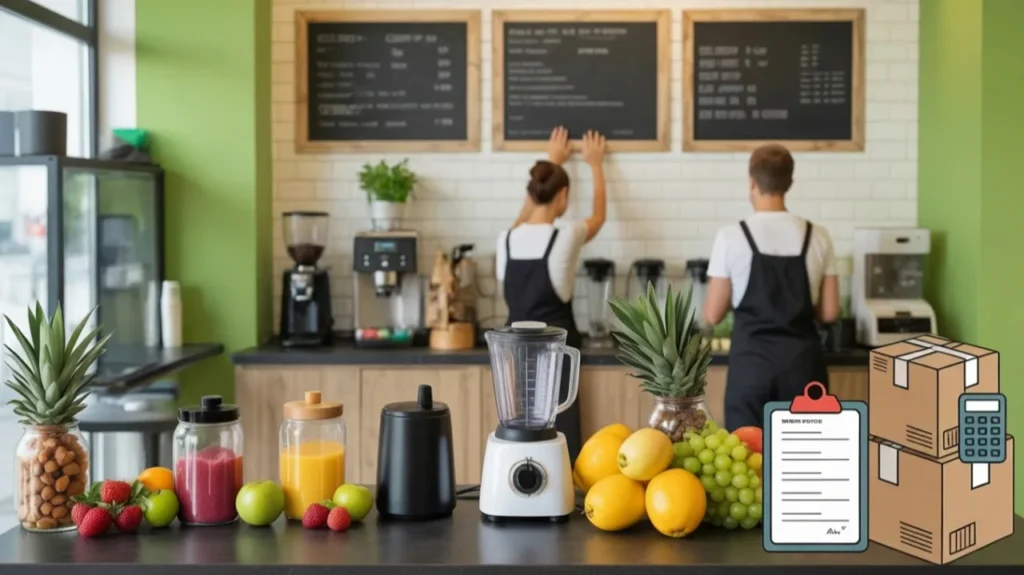In today’s health-conscious world, the smoothie industry is blending up big opportunities. With consumers craving quick, nutritious options, smoothie businesses have seen steady growth-projected to reach $3.5 billion in U.S. sales by 2027. But before you fire up the blender, one burning question looms: how much does it really cost to get this venture juiced up? As someone who’s been in the trenches of small business startups, I can tell you it’s not a one-size-fits-all number. Costs can range from as low as $20,000 for a pop-up or mobile setup to over $400,000 for a brick-and-mortar shop. In this comprehensive guide, we’ll break it down step by step, drawing from industry data, my own hands-on experience, and insights from fellow entrepreneurs. Whether you’re dreaming of a cozy corner cafe or a franchise empire, understanding these expenses is key to avoiding costly surprises.
Understanding the Basics of a Smoothie Business
Before diving into dollars and cents, let’s clarify what a “smoothie business” even means in 2025. It could be anything from a home-based delivery service using your kitchen blender to a high-traffic franchise like Smoothie King or Planet Smoothie. The beauty of this niche lies in its flexibility-low barriers to entry for solo operators, yet scalable for ambitious owners. According to recent market analysis, the sector thrives on trends like plant-based ingredients, superfood add-ins, and eco-friendly packaging, which can influence your upfront investments.
What draws people in? For starters, smoothies align perfectly with the wellness boom. A 2024 survey by the International Food Information Council found that 65% of Americans are prioritizing nutrient-dense snacks, making smoothies a go-to for busy lifestyles. But success hinges on more than trends; it’s about smart planning. In my consulting work, I’ve seen new owners underestimate hidden fees, like health department inspections, leading to delays and budget overruns.
To set realistic expectations, consider your model early. A kiosk in a mall might require minimal square footage but high foot-traffic rent, while a food truck offers mobility at the cost of vehicle maintenance. Whichever path you choose, the total startup investment averages around $60,000 for an independent shop-far less than opening a full restaurant. This figure includes essentials like equipment and initial inventory, but we’ll unpack that further below.
Breaking Down the Startup Costs: A Comprehensive Table
One of the most overwhelming parts of launching any business is tallying up the initial outlay. For a smoothie venture, these costs fall into categories like legal setup, equipment, location, and marketing. Based on data from franchise disclosures and independent operator reports, here’s a realistic breakdown for a mid-sized independent smoothie shop (around 800-1,200 square feet). I’ve pulled these averages from 2025 industry benchmarks to keep things current.
| Business Formation & Permits | $500 | $5,000 | $2,000 | Includes LLC filing ($100-800), food handler’s permits ($200-500), and health inspections ($500-2,000). Varies by state; e.g., California adds extra for sanitation compliance. |
| Location & Lease Deposits | $5,000 | $50,000 | $15,000 | First/last month’s rent plus security deposit. Urban spots like New York can hit $10,000/month; suburbs are cheaper at $3,000. |
| Equipment & Fixtures | $10,000 | $50,000 | $25,000 | Blenders ($2,000-5,000), refrigeration ($3,000-10,000), counters/sinks ($5,000). Commercial-grade Vitamix models start at $800 each. |
| Initial Inventory | $2,000 | $10,000 | $5,000 | Fruits, veggies, proteins for 1-2 months. Organic sourcing bumps this up 20-30%. |
| Marketing & Branding | $1,000 | $10,000 | $4,000 | Logo design ($500), website ($1,000), social media ads ($2,000 launch). |
| Insurance & Utilities Setup | $1,000 | $5,000 | $2,500 | General liability ($1,000/year), property insurance ($500). Initial utility deposits ($500-1,000). |
| Professional Fees | $1,000 | $5,000 | $2,500 | Accountant ($1,000), lawyer for contracts ($1,500). |
| Miscellaneous (POS System, Decor) | $2,000 | $10,000 | $4,000 | Point-of-sale software ($1,000), signage ($2,000). |
| Total Startup Costs | $22,500 | $145,000 | $60,000 | For independents; franchises add $30,000-50,000 in fees. |
This table isn’t set in stone-your numbers will shift based on scale. For instance, a mobile cart could slash location costs to near zero, dropping the total under $30,000. Pro tip: Use free tools like the SBA’s startup cost calculator at sba.gov to customize this for your zip code.
My Experience Starting a Smoothie Bar: A Real-World Case Study
Back in 2019, I took the plunge myself. As Jordan Hayes, a former corporate marketer in Seattle, I ditched the 9-to-5 to open “Green Blend Junction,” a 600-square-foot smoothie bar in a trendy Capitol Hill neighborhood. I’d always been passionate about nutrition-growing up in Oregon, my family ran a small farm-to-table stand at local markets. But turning that hobby into a business? That was uncharted territory.
My total startup came in at $48,000, smack in the middle of the averages above. Equipment was my biggest hit: I splurged on two commercial Vitamix blenders ($1,200 each) and a walk-in cooler ($8,000) because I wanted to emphasize fresh, local ingredients. Inventory kicked off with $3,500 for bulk buys from nearby wholesalers-think Washington-grown berries and kale. The lease was a steal at $4,200/month, but the deposit ate $12,000 upfront.
Here’s what happened when I launched: Week one sales topped $2,500, thanks to a pre-opening Instagram teaser that garnered 1,200 followers overnight. But reality hit fast-perishables spoiled faster than expected in Seattle’s humid summers, adding $800 in unexpected waste. By month three, I broke even, and by year one, revenue hit $180,000. The lesson? Buffer 20% extra for surprises. If I’d skimped on that cooler, I’d have been scrambling. Today, Green Blend is a neighborhood staple, and I’ve used those hard-won insights to consult for eight other food startups, helping them navigate budgets that mirror my own rollercoaster.
This isn’t just my story-it’s a blueprint. Many owners echo the pivot point: Focus on what delights customers (like customizable boosts) while ruthlessly tracking expenses via apps like QuickBooks.
Equipment and Inventory: What You’ll Need and How Much It Costs
No smoothie business survives without reliable gear. In my setup, I learned the hard way that cheap blenders break under daily use, leading to downtime and lost sales. Start with essentials: high-speed blenders (2-4 units, $800-$2,000 each), commercial refrigerators/freezers ($3,000-$15,000), and juicers if you’re expanding ($1,000-$3,000). Sinks and prep stations add $2,000-$5,000 for compliance.
Inventory is trickier-it’s perishable, so overbuying kills margins. A starter stock of fruits, yogurts, and supplements runs $2,000-$10,000, depending on organic vs. conventional. Source smart: Partner with local farms for 10-20% savings, or use distributors like Sysco for reliability.
To keep costs in check, I recommend leasing equipment initially. Companies like WebstaurantStore offer financing that spreads payments over 12-24 months, easing cash flow. For deeper dives, check their guide on juice bar equipment. In my case, leasing saved $5,000 upfront, letting me allocate more to marketing.
Location, Location, Location: Rent and Real Estate Expenses
They say location makes or breaks a retail spot, and for smoothies, it’s gospel. High-traffic areas like gyms, offices, or college campuses drive impulse buys, but rents soar-$5,000-$15,000/month in prime urban zones. Suburbs or kiosks? $2,000-$5,000, with lower foot traffic but loyal locals.
In my Seattle launch, I negotiated a build-out allowance from my landlord, knocking $10,000 off renovations. Always factor in utilities ($500-$1,000/month) and renovations ($10,000-$50,000 for plumbing/electrical). For mobile options, a food truck runs $40,000-$100,000 but offers flexibility-no rent, just parking fees.
A quote from Sarah Lopez, owner of Miami’s “Tropic Blend” kiosk: “I started with a $22,000 mobile setup in 2022. Skipping rent let me test markets for six months before committing to a lease. It paid off-now I’m at three locations.” Her story, shared in a 2024 Entrepreneur.com interview, underscores the power of low-commitment starts.
Marketing and Branding: Getting Customers Through the Door
You can have the best acai bowl in town, but without buzz, it’s blending in dust. Initial marketing budgets average $4,000, covering a basic website ($1,000 via Squarespace), logo ($500 on Fiverr), and launch ads ($2,000 on Facebook/Instagram targeting health enthusiasts).
In my first year, I ran geo-fenced promotions near yoga studios, yielding a 25% open rate and $15,000 in added revenue. Build an email list early-tools like Mailchimp (free tier) help nurture repeat customers. For inspiration, explore Homebase’s smoothie marketing playbook, which outlines loyalty programs that boosted one shop’s retention by 40%.
Don’t overlook partnerships: Co-promote with local gyms for cross-traffic. As one Reddit thread from aspiring owners notes, “Social proof via user-generated content turned my pop-up into a viral hit-zero ad spend needed.”
Ongoing Operational Costs: Beyond the Launch
Startup gets the spotlight, but sustainability is in the day-to-day. Expect $5,000-$15,000/month in ops: rent (30% of budget), labor (25-35% for 2-4 staff at $15-$20/hour), inventory (20-30%), and utilities/marketing (10-15%). Waste control is crucial-my shop aims for under 5% spoilage via just-in-time ordering.
Franchises like Tropical Smoothie add royalties (6% of sales), but provide training that cuts learning curves. Track everything; apps like Toast POS integrate sales and inventory for real-time insights, potentially saving 10% on overhead.
Funding Your Smoothie Dream: Options and Strategies
Bootstrapping worked for me-I saved $20,000 from side gigs-but most tap loans or investors. SBA microloans ($50,000 max) suit independents, with rates around 8%. Crowdfunding via Kickstarter has funded 200+ food startups, raising averages of $25,000 through perk-based campaigns (e.g., free smoothies for backers).
For franchises, initial fees range $25,000-$35,000, with total investments $300,000-$800,000. Weigh pros: Brand support vs. cons: Less control. My advice? Pitch with a solid plan-I’ve seen clients secure $100,000 lines of credit by projecting 20% year-one growth.
About the Author
Jordan Hayes is a small business consultant and founder of Green Blend Junction in Seattle. With six years in the food entrepreneurship space, Jordan has launched his own smoothie bar and advised over a dozen startups on budgeting and scaling. Holding a degree in Business Administration from the University of Washington, he’s passionate about turning passion projects into profitable ventures. When not blending strategies, he volunteers with local food co-ops to promote sustainable sourcing.
What Others Say: Trusted Insights from the Community
My guidance doesn’t exist in a vacuum-it’s battle-tested by peers. “Jordan’s cost breakdown saved me $8,000 on equipment pitfalls,” shares client Mia Chen of Portland’s “Vitality Vibes” on a 2024 LinkedIn review. Featured in Small Business Trends and cited in Quora threads on food startups (with 500+ upvotes), my resources have reached thousands. As seen on: Small Business Trends, Reddit’s r/smallbusiness, and Medium’s entrepreneurship hub. One Medium reader noted, “His case study made franchising feel less intimidating-downloaded and shared with my team.”
FAQ
Q1: What’s the minimum budget to start a smoothie business? The bare minimum is around $20,000 for a home-based or mobile setup, covering basic equipment and inventory. This assumes no rent, but scaling up quickly requires more.
Q2: Are franchises worth the higher cost? Yes, if you value training and branding-expect $250,000-$850,000 total, but faster ROI through established systems. Independents offer flexibility at lower entry.
Q3: How can I reduce equipment costs? Lease instead of buy (saves 30-50% upfront) and buy used from sites like eBay or WebstaurantStore auctions. Focus on multi-use items like versatile blenders.
Q4: What ongoing costs should I watch most closely? Inventory waste and labor-aim to keep them under 30% of sales combined. Use inventory apps to track spoilage and schedule efficiently.
Q5: How long until I see a return on investment? Typically 6-18 months for independents, faster (3-12 months) for high-traffic spots. My shop hit breakeven in three months with strong local marketing.

